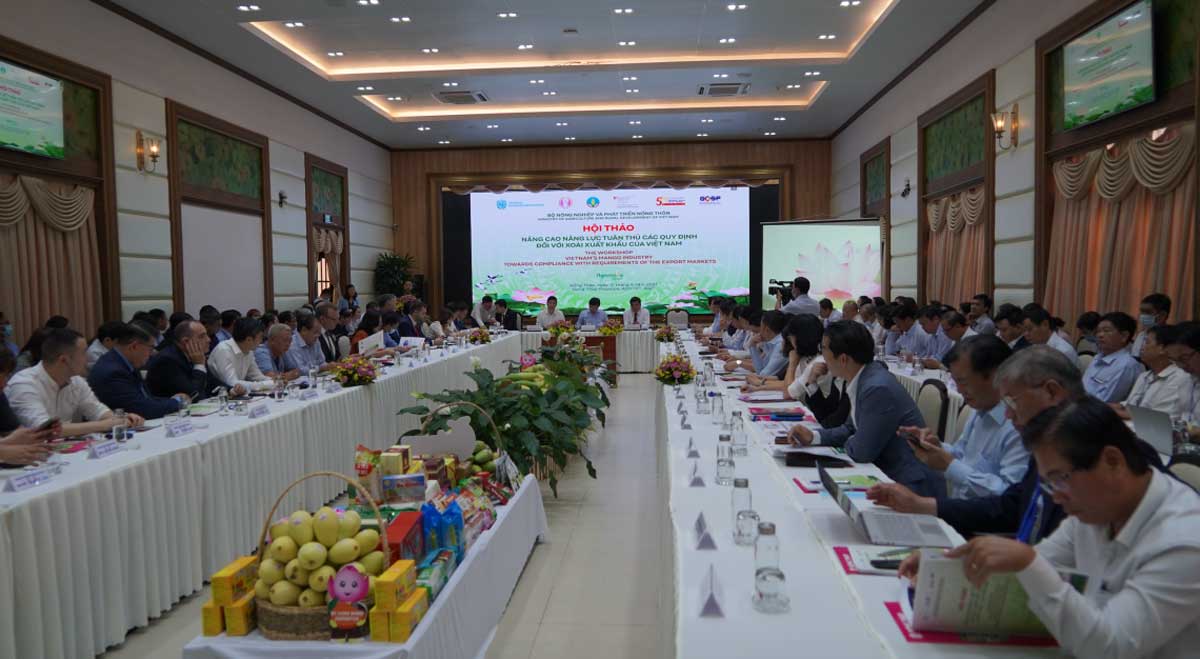A Swiss-funded project, implemented by the United Nations Industrial Development Organization (UNIDO), is helping mango value chain stakeholders in the Mekong River Delta to maximize export opportunities.
Viet Nam is the world’s 13th largest producer of mangoes, with an annual production of 788,000 tons (2018). Much of this production is cultivated in four provinces in the Mekong River Delta in south-western Viet Nam.
With world demand for mangoes continuing to surge, Viet Nam is well-placed to diversify its mango export markets. Currently, the vast majority of mango exports are destined for neighbouring China, but the short shipping links to important markets in the Republic of Korea, Japan, Singapore and Australia offer obvious opportunities for diversification.
A project workshop has brought together more than 150 representatives of different mango value chain stakeholders, including government ministries, local authorities of Mekong River Delta provinces, farmers, cooperatives, packing houses, exporters and logistics companies, as well as representatives of importing countries. In the workshop’s technical session, participants were advised by experts on what needs to be done and what conditions need to be met in order to be able to export in terms of quality infrastructure, and value chain and market promotion, and the key requirements for establishing a sustainable, diversified and high-value export market.
The workshop was organized in the framework of the project, “Increasing the standards and quality compliance capacity of the mango value chain in Mekong River Delta”, funded by the Swiss State Secretariat for Economic Affairs (SECO).
During the workshop, Jonas Grunder, Deputy Director of SECO in Viet Nam, said the country has signed some key trade agreements such as the Comprehensive and Progressive Agreement for Trans-Pacific Partnership (CPTPP), the Regional Comprehensive Economic Partnership (RCEP) and the Viet Nam-EU FTA (EVFTA). But he noted that despite the opportunities to strengthen integration into the world trade system, Viet Nam’s agricultural sector still faces numerous challenges in substantially increase their access to global markets. This is why, he said, the Swiss Federal Economic Bureau had decided to join hands with UNIDO to start a technical assistance programme focusing on the mango value chain in the Mekong Delta.
Tran Thanh Nam, Viet Nam’s Deputy Minister of Agriculture and Rural Development, highlighted the important role of cooperative in the effort to improve the quality of mangoes. He also added that farmers in the provinces should increase efforts to comply with the VietGAP and GlobalGAP standards of good agricultural practice.
On the margins of the workshop, the Ministry of Agriculture and Rural Development, UNIDO, the International Agricultural Development Fund (IFAD), the Dong Thap Provincial People’s Committee and Ben Tre Provincial People’s Committee co-signed a joint declaration to develop the fruit value chain in the Mekong River Delta through the project, “Building Forward Better: A Resilient Women and Youth-Centred and Digitally Enhanced Value Chain Development in Vietnam”, with the financial support of the United Nations COVID-19 Response and Recovery Multi-Partner Trust Fund (UN COVID-19 MPTF).


